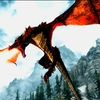Introduction
With just over 600 words to work with, it can certainly be a challenge to express things in the canon language. Lately I've been working on a canon dictionary/thesaurus that has both the listed definitions and English-Dragon entries that point to the closest canon equivalent. It's taking a lot of work but it's going really well so far. I am currently through letters A-G (close to 200 words) with almost 2,500 English-Dragon entries. I expect the final dictionary to have over 6,000 English-Dragon entries, which is close to what our full dictionary has.
This got me thinking about word meaning in the canon language and how we can use words in new ways, and also make the language more unique.
Expanding Semantics
Consider the word lok with the given definition of "sky." With this we might use it exactly like we would the English word "sky." Shul los ko lok. "The sun is in the sky." Lok lost gram "The sky has clouds." That is the limited extent of its usefulness.
Here is where the new idea on semantics makes its entrance. Words in the dragon language convey not just specific meaning ("sky"), but a broad range of concepts and notions intrinsic to the Thu'um. Lok isn't just "sky," but conveys the concept of being high or above. Tum isn't just "down" but conveys the concept of being under, below, or within.
As an example, the banners in High Hrothgar read Lok bo, Thu'um tum. This doesn't make much sense with the meaning we'd want to literally give it: "Sky fly, Voice down." But if we look at it from this new perspective, looking at the concepts each word carries, then we can arrive at "Sky (flying) above, Voice (down) within."
Other examples:
- Zu'u lok hi "I am above you." Here lok carries the sense of being high or above.
- Hi tum zu'u. "You are beneath me." Here tum carries the sense of being below or beneath. Zu'u carries the concept of referring to myself regardless, of case ("I" vs. "me").
- Zu'u fen golt hin grahmindol. "I will halt your plan." The word "ground" here represents limiting or preventing. Even in English "to ground" something implies a limitation or constriction, and this would be especially true for dragons. Grahmindol "stratagem" (lit. 'battle-trick") conveys the idea of something that is planned or plotted.
- Mu ronaaz het. "We sped directly here." (lit. "we arrowed here") Ronaaz with the given definition of "arrow" is sued as a verb here to convey the sense of "to move like an arrow," swift and directly.
- Aal pruzah "That seems good." Aal with the given definition of "may" is used here to convey possibility or probability. "That may be good" is a more literal translation.
In short, words can be used a lot more flexibly than with just the meaning in their given English equivalents. Try using words in new ways and see what you can come up with!




